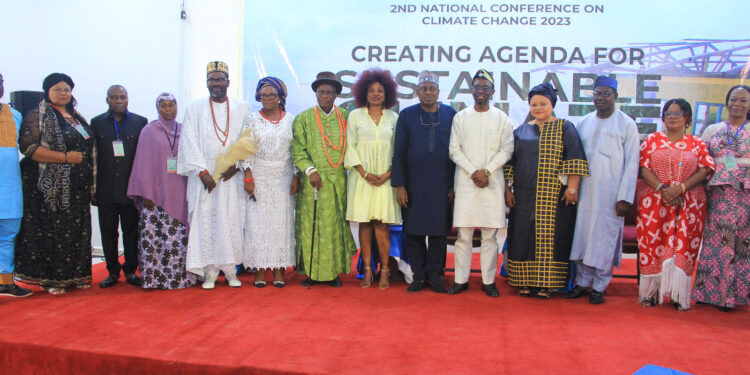The Executive Director of Corporate Accountability and Public Participation Africa (CAPPA), Mr Akinbode Oluwafemi has expressed concern over the plight of over 62 million Nigerians affected by the impact of climate change, especially in the northern part of the country.
He raised the concern on Monday in Abuja at the second national conference on climate change, themed ‘Creating an Agenda for Sustainable Climate Finance For Nigeria’, organised CAPPA.
According to him, desertification which has encroached on arable lands, is affecting roughly 580,841 square kilometers out of 927,892 square kilometers for the situation.
He also identified climatic fluctuations, deforestation, extensive cultivation, overgrazing, marginal land use, bushfires, firewood harvesting, faulty irrigation systems, and urbanization as major contributing factors to the phenomenon.
He said that Nigeria’s climate finance is yet to be reflective of the country’s vulnerability in view of the fact that efforts in adaptation and mitigation are yet to be scaled up significantly to embrace the realities.
“Climate finance in Nigeria has relied exclusively on concessional debt which is about 46% and non-concessional debt at 25%. Grant and equity-based finance currently play a relatively minimal role in Nigeria’s climate finance ecosystem, at 5% and 12% respectively.
“Nigeria like every other country in sub-Saharan Africa is classed as a vulnerable country considering its exposure to climate risks,” Oluwafemi said.
He warned that the effects of climate change are set to accelerate over the coming years unless progressive climate finance and a well-structured loss and damage funding mechanism are institutionalized and appropriately managed.
“The impacts of climate change are visible to the least observing eyes in Nigeria and the drivers of this reality are not unknown. Frontlines continue to bear the consequences of actions they are not responsible for. Those responsible for the climate crises continue to avoid liabilities, delay response and water down agitations for commiserate compensation.
“No thanks to the oversight of government policies. The loss and damage fund that should address historical liabilities is being technically silent or replaced with immediate liquidity at the expense of justice. Government rule books and policies are only catching up. Climate crises are miles ahead.
“Authorities including the Intergovernmental Panel on Climate Change (IPCC), United
Nations Framework Conventions on Climate Change (UNFCCC), and the Nigeria Climate Change Vulnerability Index are unanimous in their caution of the imminent climate change devastations even if immediate decarbonization is adopted,” he said.
Delivering the keynote a former Vice Chancellor, Lagos State University (LASU), Prof. Olanrewaju Fagbohun, SAN, said 52 developing countries, including Nigeria, are currently suffering severe unsustainable national debt burdens that must be urgently addressed.
He said that the increase in the costs of debt servicing associated with climate vulnerability has become an issue of serious concern.
“For emerging markets, low and medium-income economies in particular, climate vulnerability and unsustainable debt burdens have diminished the fiscal space for investment in climate resilience.
Currently, 52 developing countries are suffering severe unsustainable national debt burdens.”
“There are serious mitigation and adaptation funding gaps. As revealed in a 2022 climate finance funding analysis, public and private sector entities across the globe require about $3.8trillion in climate finance per year through 2025. Only about 16 percent of these needs are currently being met, with the largest unmet needs in developing countries in Africa and the Middle East.
“Between 2019 and2020, over 60 percent of climate finance (around $384bn) entails borrowing funds. Out of this amount only $47bn came with low cost or concessional interest rates. No cost grant was about $36bn. The balance came with high financing cost,” Fagbohun, who is also a Professor of Environmental Law said.
Also, the Minister of State for Environment, Dr Iziaq Salako said Nigeria, like many other nations, is grappling with the devastating impacts of climate change, including extreme weather events and ecological disruptions.
Represented by the Deputy Director, Department of Climate Change (DCC), Ministry of Environment, Mr Jonah. D. Barde, the minister said, “As we confront these challenges, we must recognize that addressing climate change is not solely an environmental concern. It is an economic, social, and moral imperative that demands coordinated and collective action.”
He said the Federal Government is fully committed to addressing climate change and promoting sustainable climate finance and is also working towards Nationally Determined Contributions (NDCs) and the global climate goals set out in the Paris Agreement.











